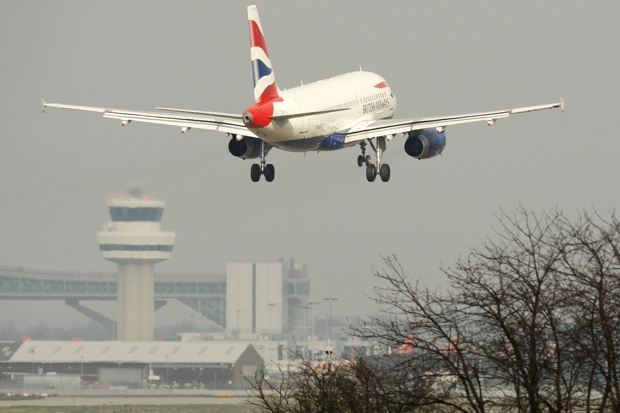Easter is a good time to talk about airports — or perhaps a bad time, if you bought your Spectator in the shopping labyrinth that impedes your path to the departure gate after a maddening wait in the security queue, where only a quarter of the scanners are working. I’m with you, and not just in spirit: in fact, that’s me being led away by men with machine guns, after an altercation over the contents of my wash-bag.
It’s a curious fact that no one has ever succeeded in imbuing airport terminals with the romance, dignity and passenger satisfaction quotient of 19th-century railway stations. At best they are soulless, at worst a stress-filled vision of hell. Our future as a trading nation and tourist destination depends upon them, yet we seem incapable of designing a better model, or deciding how best to redevelop existing ones in the interests of growth and efficiency with the least environmental harm. Ministers and business chiefs chant that we must have a ‘hub’ to connect us to otherwise lost cities across Asia and Latin America that are ravenous to do business with us. But no one can agree where to put it, or how to make it human.
Deliverability
This can of nimbyist perils has been kicked around by politicians since the Roskill Commission of 1968 — whose chosen site for a new airport, Cublington near Aylesbury, is as green and pleasant today as it was when villagers defeated the proposal. Its place on the drawing board was taken by Maplin Sands, first of several Thames Estuary non-starters of which the most recent is ‘Boris Island’ — whimsically supported by this column but now effectively ruled out on grounds of cost and bird disturbance by the interim findings of the Airports Commission.
Set up in 2012 to kick the can into the shrubbery again, under the chairmanship of former CBI head Sir Howard Davies, the commission was asked to deliver a final report in ‘summer 2015’ — safely beyond the election. So we shall hear before August which of three shortlisted proposals the Davies panel favours for a major step-up in airport capacity by 2030. The choice is between a new northwestern runway long envisaged by Heathrow’s owners, BAA, or the maverick ‘Heathrow Hub’ scheme for a westward extension of one of the two existing runways; or a second runway at Gatwick. A choice will certainly be made, because Davies himself is in a hurry: he takes up the chairmanship of RBS on 1 September.
But we still won’t know what’s going to happen, because no political party will commit in advance to accept the commission’s view. If the election is close, nothing may happen at all, because a fragile government will be even less keen to alienate floating voters under the flight path. Cynics say Davies was picked because he could be relied upon to deliver the Heathrow answer that Whitehall and big business want, while giving previously opposed politicians an excuse for a U-turn. But will they be brave enough? Willie Walsh — chief executive of IAG, which owns British Airways and Iberia and is bidding for Aer Lingus — is one industry leader who doesn’t believe so: he has called Heathrow expansion a ‘lost cause’.
The ‘business case’ clearly favours Heathrow nevertheless. And of the two Heathrow proposals, BAA’s is the serious one; the alternative Hub idea, brainchild of ex-Concorde pilot Captain Jock Lowe, remains just that — an idea in search of a backer. Either way, the problem is ‘deliverability’: noise apart, the decade-long construction project would bring chaos to surrounding communities and motorways — and a row over air quality, already below EU standards, threatens to be a major obstacle.
Obviously?
As for ‘Gatwick Obviously’ (as the posters have it), insiders claim the deliverability factor is ‘five to ten times higher’ because the environmental impact is smaller and construction would be less disruptive. But the downside is lack of commercial attraction. As Willie Walsh also observes, ‘You won’t find many airlines that say, “God, I’d love to be able to fly to Gatwick.” ’
Most likely, governments will go on failing to create strategic airport capacity just as they have failed to create strategic energy capacity, nuclear or otherwise, to keep our lights on a decade hence. It’s just too difficult to take big infrastructure decisions and win elections at the same time. The can-kicking will go on — as will the overcrowding of Heathrow, where full-capacity pressures create a cattle-truck experience that shames London and adds (by the airport’s own estimate) £95 to the cost of a return flight.
A sensible solution, you might think, would be to encourage (by slashing punitive Air Passenger Duty, for a start) expansion of smaller airports within reach of the capital, to ease pressure. But that can’t happen until there’s a post-Davies decision. And meanwhile London mayor Boris Johnson has just refused on grounds of noise, not to mention electoral calculation, an expansion of City Airport that would have doubled its passenger capacity by 2023.
That’s a pity, because City is a model of how friendly a small airport can be. I suspect smaller and regional airports, with capacity to expand and potential for improved ground connections, will eventually be declared the only deliverable path to further growth in UK aviation. That would bring Stansted, Birmingham, Manchester and Edinburgh to the fore, making use of hubs in Amsterdam, Frankfurt and even faraway but hyper-efficient Dubai; it would also complement a bigger Gatwick. Third-division players such as Liverpool John Lennon and Leeds-Bradford have declared support for Heathrow expansion, but may never get it.
The more I think about this problem, the more I believe the solution is anywhere but Heathrow. If I can figure that out, I’m sure Sir Howard Davies’s team can too. If and when I’m released from this airport interrogation cell, I’ll have a tenner with Betfair on Gatwick to win.







Comments